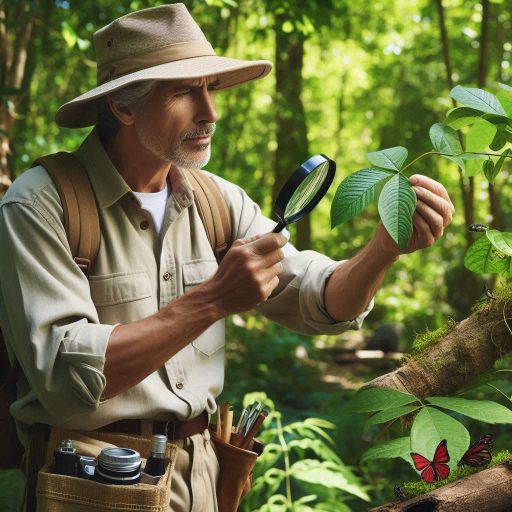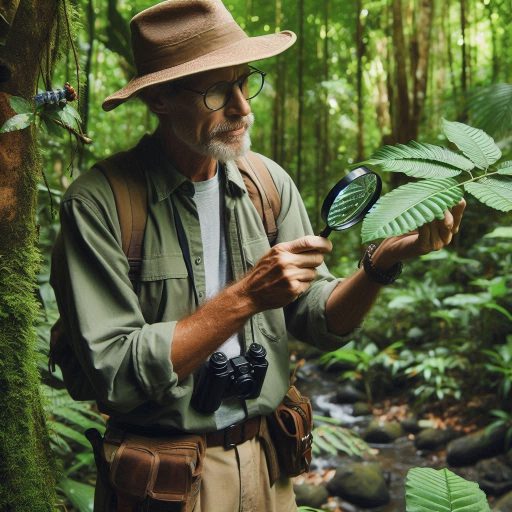Introduction
Ecology is the study of interactions between living organisms and their environments, encompassing a diverse range of topics.
This scientific field examines how organisms coexist, compete, and adapt within their ecosystems.
Ecologists analyze the relationships among species, their habitats, and the surrounding environment.
They explore everything from the smallest microorganisms to the largest ecosystems, revealing the complexities of life on Earth.
In today‘s world, ecological knowledge is vital for addressing pressing environmental challenges.
Issues like climate change, habitat destruction, and pollution threaten biodiversity and the stability of ecosystems.
Ecologists provide insights that guide conservation efforts and promote sustainable practices, ultimately benefiting both nature and humanity.
Having the right skills is essential for a successful career in ecology.
Professionals in this field must possess a diverse skill set to navigate the complexities of ecological research and conservation.
Strong analytical skills enable ecologists to assess complex data and interpret results effectively.
They must understand statistical methods to draw meaningful conclusions from their research.
Effective communication skills are equally important, as ecologists need to convey their findings to various audiences.
Whether presenting research at conferences, writing scientific papers, or engaging with the public, clear communication enhances understanding and impact.
Strong scientific background
Understanding of Basic Ecological Principles
Understanding basic ecological principles is crucial for anyone entering the field.
This foundational knowledge allows ecologists to comprehend the relationships between organisms and their environments.
Key concepts include ecosystems, biodiversity, food webs, and population dynamics.
Familiarity with these principles helps ecologists make informed decisions regarding conservation and environmental management.
Moreover, understanding ecological interactions aids in predicting how changes affect ecosystems.
Knowledge of concepts such as succession and biogeochemical cycles is also important.
This foundational understanding guides research questions and conservation strategies.
Ability to Conduct Research and Analyze Data
The ability to conduct research and analyze data is a vital skill for ecologists.
Research enables ecologists to gather information about various ecological phenomena.
Collecting data through fieldwork, experiments, and surveys is essential for understanding ecological systems.
Once data is collected, ecologists must analyze it to draw meaningful conclusions.
Familiarity with statistical tools and software enhances their ability to interpret data accurately.
Additionally, presenting research findings clearly is crucial for effective communication.
This skill helps convey complex information to diverse audiences, including policymakers and the public.
Strong analytical skills empower ecologists to assess the impact of environmental changes on ecosystems.
Knowledge of Various Research Methodologies and Techniques
Knowledge of various research methodologies and techniques is vital for conducting effective ecological research.
Ecologists must be familiar with qualitative and quantitative research methods.
Techniques may include remote sensing, GIS analysis, and ecological modeling.
Understanding these methods allows ecologists to design robust studies and gather reliable data.
Moreover, staying updated on emerging technologies and methodologies enhances research quality.
Familiarity with sampling techniques, such as random or stratified sampling, improves data collection efforts.
Field skills are also crucial for effective ecological research.
Proficiency in identifying species and collecting samples accurately is essential.
Moreover, ecologists often work in challenging environments, requiring adaptability and problem-solving skills.
Knowledge of laboratory techniques, such as DNA analysis and microscopy, further supports research efforts.
Basically, a successful career in ecology hinges on several key skills.
Understanding basic ecological principles forms the foundation for informed decision-making.
The ability to conduct research and analyze data allows ecologists to explore ecological phenomena.
Knowledge of various research methodologies and techniques enhances research quality and effectiveness.
By developing these skills, aspiring ecologists can contribute meaningfully to environmental conservation and management.
Ultimately, these competencies prepare professionals for the challenges of a rapidly changing world.
Critical thinking skills
When it comes to pursuing a successful career in ecology, having the right skills is crucial.
One of the key skills that individuals need to possess is critical thinking skills.
Here are some important aspects of critical thinking skills
Ability to problem solve and think creatively
Ecologists are often faced with complex and challenging problems that require creative solutions.
Having the ability to think outside the box and come up with innovative ideas is essential in this field.
Whether it’s devising a new research method or finding ways to conserve a particular ecosystem, ecologists need to be able to think critically and creatively.
Analytical skills to interpret data and draw conclusions
Data analysis is a fundamental part of ecological research.
Ecologists collect large amounts of data from fieldwork and experiments, and they need to be able to analyze this data effectively to draw meaningful conclusions.
Being able to interpret data accurately and derive insights is essential for making informed decisions and recommendations in ecology.
Capacity to think critically about complex ecological issues
Ecological issues are often multifaceted and interconnected, requiring a deep understanding of the relationships between different components of an ecosystem.
Ecologists need to be able to critically evaluate these complex issues, considering various perspectives and potential impacts.
Having the capacity to think critically about ecological issues enables ecologists to propose sustainable solutions and address challenges effectively.
Overall, critical thinking skills are indispensable for a successful career in ecology.
By honing these skills, individuals can become experienced ecologists who are equipped to tackle the environmental challenges of today and contribute to the conservation and sustainable management of our natural world.
Read: Earning Potential: Chemist Salaries Across US States
Communication skills
Effective Communication with Colleagues, Stakeholders, and the Public
Effective communication is essential for success in ecology.
Ecologists often work in diverse teams that include scientists, policymakers, and community members.
Clear communication helps ensure that everyone understands the project goals and methodologies.
You must articulate complex ecological concepts in a way that is accessible to various audiences.
This skill builds collaboration and fosters understanding among team members.
When engaging with stakeholders, effective communication is even more crucial.
You need to convey your findings to non-specialists who may influence policy or funding decisions.
Crafting messages that resonate with these stakeholders helps secure support for your projects.
Moreover, communicating effectively with the public enhances awareness and appreciation for ecological issues.
You can help promote conservation efforts by explaining their importance clearly.
Utilizing various communication platforms also enhances your outreach.
You may need to adapt your message for social media, presentations, or community meetings.
Being versatile in your communication methods will ensure you reach a broader audience.
Always remember that effective communication builds trust and encourages collaboration.
Writing Reports, Articles, and Proposals
Strong writing skills are vital for ecologists.
You will frequently write reports summarizing research findings and project progress.
These reports must be clear, concise, and well-organized.
Clarity in your writing helps convey complex information effectively to various audiences.
Additionally, you may be required to write scientific articles for publication.
Publishing your research contributes to the body of knowledge in ecology.
These articles should follow specific guidelines and formatting styles set by scientific journals.
Mastering academic writing helps you establish credibility in the scientific community.
Writing grant proposals is another essential skill.
Funding organizations often require detailed proposals outlining your research objectives, methodologies, and budget.
A well-written proposal can secure the necessary funding for your projects.
Clear and persuasive writing is crucial to demonstrate the value and feasibility of your research.
Presenting Research Findings at Conferences and Meetings
Presenting research findings is a key component of an ecologist‘s career.
Conferences and meetings offer opportunities to showcase your work and connect with other professionals.
You must develop strong presentation skills to engage your audience effectively.
Practicing your delivery will help you communicate your findings confidently.
Utilize visual aids, such as slides and charts, to enhance your presentations.
Visuals can simplify complex information and help your audience grasp key points.
Ensure that your presentations are organized and focused on the main findings.
Tailor your message based on your audience’s knowledge and interests to keep them engaged.
Participating in discussions after your presentations can also provide valuable feedback.
Engaging with other researchers encourages collaboration and helps refine your work.
Networking at these events can lead to future research opportunities and partnerships.
Therefore, a successful career in ecology requires effective communication, strong writing skills, and the ability to present research findings confidently.
Developing these skills will enhance your impact in the field and promote meaningful collaboration.
By honing these abilities, you can significantly contribute to ecological research and conservation efforts.
Read: Top Chemistry Departments and Schools in the US
Fieldwork experience
Hands-On Experience in Conducting Fieldwork and Collecting Data
Hands-on experience in conducting fieldwork is crucial for a successful career in ecology.
Fieldwork allows you to apply theoretical knowledge to real-world situations.
It enhances your understanding of ecological principles and processes.
During fieldwork, you learn how to collect and analyze data effectively.
Collecting data involves using various techniques and tools.
Familiarity with GPS devices, field sampling equipment, and data loggers is essential.
You must know how to record information accurately and systematically.
This practice helps ensure the reliability of your research findings.
Fieldwork also teaches you important problem-solving skills.
Unexpected challenges can arise during data collection.
You may need to adapt your methods or approaches to overcome these obstacles.
Developing these skills strengthens your ability to conduct research independently.
Familiarity with Various Ecosystems and Habitats
Understanding different ecosystems and habitats is vital for ecologists.
Each ecosystem has unique characteristics, species, and ecological processes.
Familiarity with these environments enables you to conduct more comprehensive research.
It also helps you assess the impacts of human activities on various habitats.
Ecologists must understand the relationships between organisms and their environments.
Knowledge of biomes, such as forests, wetlands, and grasslands, is essential.
This understanding allows you to identify key species and their roles within ecosystems.
Additionally, you can recognize the signs of ecological change and degradation.
Research often requires you to collaborate with other scientists and stakeholders.
Familiarity with various ecosystems enhances communication and teamwork.
You can share insights and findings more effectively, contributing to collective understanding and problem-solving.
Ability to Work in Challenging Environments
Ecologists frequently work in challenging environments, both physically and mentally.
Fieldwork can take place in remote locations, extreme weather, and rugged terrains.
Therefore, adaptability and resilience are essential skills for success.
You must be prepared for physical demands, such as hiking or lifting equipment.
Maintaining a positive attitude in difficult conditions is crucial for effective research.
Staying focused on your goals helps you overcome obstacles and complete tasks efficiently.
Moreover, working in challenging environments often involves teamwork.
Collaborating with colleagues helps distribute the workload and fosters camaraderie.
Developing strong communication skills is vital for coordinating efforts in the field.
In addition, you may encounter various wildlife species during fieldwork.
Understanding safety protocols and how to interact with animals is essential.
This knowledge ensures your safety and the well-being of the ecosystem you are studying.
Generally, several key skills are required for a successful career in ecology.
Hands-on experience in fieldwork and data collection is vital for practical knowledge.
Familiarity with various ecosystems and habitats enhances your understanding of ecological relationships.
Finally, the ability to work in challenging environments builds resilience and adaptability.
Developing these skills will prepare you for a rewarding career in ecology.
Read: How to Become a Licensed Chemist in the USA: Steps and Tips

Project management skills
Top Skills Required for a Successful Career in Ecology
A successful career in ecology demands a diverse skill set.
Among these, organizational skills stand out as vital.
Ecologists must plan and execute research projects effectively.
They need to manage multiple tasks simultaneously.
Strong organizational skills help professionals stay on track and meet deadlines.
This capability ensures that data collection, analysis, and reporting occur smoothly.
Effective project planning begins with clear goals.
Ecologists must outline objectives before commencing any research project.
They should establish timelines and allocate resources efficiently.
A well-structured plan minimizes confusion and streamlines the research process.
It also helps in anticipating potential challenges.
When obstacles arise, organized professionals can adapt quickly and find solutions.
Budgeting and Time Management Skills
Budgeting is another essential skill for ecologists.
Many research projects require funding, making financial management crucial.
Professionals must develop budgets that outline expected costs.
This process includes identifying expenses for equipment, personnel, and materials.
Proper budgeting ensures that projects remain financially viable.
It also helps secure funding from grants or organizations.
Time management skills go hand in hand with budgeting.
Ecologists often work under tight deadlines.
They must prioritize tasks to ensure timely completion.
Effective time management involves setting realistic goals and milestones.
Professionals should break down larger projects into manageable segments.
This approach allows them to focus on one task at a time.
Transform Your Career Today
Unlock a personalized career strategy that drives real results. Get tailored advice and a roadmap designed just for you.
Start NowAbility to Coordinate Teams and Work Efficiently Towards Project Goals
In addition to individual skills, the ability to coordinate teams is essential.
Ecologists frequently work in collaborative environments.
They need to communicate effectively with colleagues, stakeholders, and the public.
Clear communication fosters teamwork and helps maintain a shared vision.
Coordinating a team involves delegating tasks based on individual strengths.
Understanding each team member‘s skills enhances overall productivity.
Working efficiently toward project goals requires a focus on collaboration.
Team members should be encouraged to share ideas and feedback.
This open dialogue promotes innovation and problem-solving.
A successful ecologist understands how to motivate team members.
They inspire a sense of ownership and accountability within the group.
Furthermore, ecologists must adapt to diverse work environments.
They may conduct fieldwork, laboratory research, or data analysis.
Each setting requires flexibility and the ability to switch gears quickly.
Strong organizational skills allow professionals to transition between tasks seamlessly.
Adaptability ensures that they can tackle any challenge that arises.
Read: Biology Ethics: Navigating Complex Issues in the US
Collaboration skills
Ability to Work in Multidisciplinary Teams
A successful career in ecology requires a diverse skill set.
Among these, the ability to work in multidisciplinary teams stands out.
Ecological issues are complex and multifaceted.
They often require input from various fields, such as biology, geography, and environmental science.
By collaborating with professionals from different disciplines, ecologists can develop comprehensive solutions to environmental challenges.
Effective communication is essential for working in multidisciplinary teams.
Ecologists must convey their ideas clearly and concisely.
They should also be open to feedback and suggestions from colleagues.
This openness fosters an environment of collaboration and creativity.
Team members who communicate well can build trust and respect, leading to more productive collaborations.
Collaboration with Other Scientists, Policymakers, and Stakeholders
Collaboration with other scientists, policymakers, and stakeholders is another critical skill for ecologists.
Ecologists often conduct research that informs environmental policy and management.
To influence decision-making, they must effectively communicate their findings to non-scientists.
This involves translating complex scientific data into understandable language.
Building strong relationships with policymakers is vital.
Ecologists should engage with local, state, and federal agencies.
By sharing research findings, they can help shape policies that promote sustainability and conservation.
Collaborating with stakeholders, such as landowners and community groups, enhances the impact of ecological research.
Engaging these groups ensures that ecological initiatives consider local needs and priorities.
Building Partnerships and Networks to Address Ecological Challenges
Networking is essential for building partnerships in the ecological field.
Ecologists should actively seek opportunities to connect with other professionals.
Attending conferences, workshops, and seminars allows ecologists to meet peers and leaders in their field.
These interactions often lead to collaborative projects and research opportunities.
Networking can also facilitate job searches and career advancement.
In addition to networking, ecologists should develop partnerships with academic institutions, government agencies, and non-profit organizations.
These partnerships can provide valuable resources, funding, and expertise.
Collaborative research efforts can lead to innovative solutions for pressing ecological challenges.
By working together, these organizations can leverage their strengths and create a more significant impact.
Problem-solving is a crucial skill for ecologists as well.
They must analyze complex ecological data and develop practical solutions.
This involves critical thinking and creativity.
Ecologists often face unexpected challenges in the field.
Being adaptable and resourceful helps them overcome these obstacles.
Finally, leadership skills are essential for those aspiring to advance in their careers.
Ecologists should take initiative and inspire others to engage in conservation efforts.
They should advocate for ecological research and its importance in policy-making.
By leading projects and teams, they can drive positive change in the field.
In summary, a successful career in ecology requires various skills.
The ability to work in multidisciplinary teams, collaborate with scientists and policymakers, and build partnerships is essential.
Networking and problem-solving further enhance an ecologist‘s effectiveness.
By developing these skills, aspiring ecologists can contribute to meaningful solutions for the environment.
Gain More Insights: Balancing Clinical Work and Research in Immunology
Environmental policy knowledge
Understanding of Laws and Regulations Related to Environmental Conservation
A strong understanding of laws and regulations is vital for ecologists.
These laws govern how we protect natural resources and habitats.
Familiarity with the Endangered Species Act and the Clean Water Act is essential.
These regulations guide conservation efforts and resource management strategies.
Ecologists must stay updated on local, state, and federal laws.
This knowledge enables them to navigate compliance and enforce environmental protection.
Understanding laws also helps ecologists work effectively with government agencies.
They often collaborate on projects requiring regulatory approval.
Knowledge of permitting processes is crucial for successful project implementation.
Furthermore, understanding environmental regulations aids in policy advocacy.
Ecologists can identify gaps in regulations and advocate for necessary changes.
A solid grasp of laws and regulations helps ecologists educate the public.
They can explain the importance of compliance and conservation efforts.
Public awareness fosters community support for environmental initiatives.
This understanding enhances the overall impact of ecological work.
Knowledge of Current Environmental Issues and Challenges
A successful career in ecology demands knowledge of current environmental issues.
Ecologists should understand climate change, habitat loss, and pollution.
These challenges significantly affect ecosystems and biodiversity.
Being informed about these issues allows ecologists to develop effective strategies.
Understanding emerging environmental threats, such as invasive species, is equally important.
Invasive species can disrupt local ecosystems and threaten native species.
Ecologists must recognize the signs and implications of these threats.
Knowledge of current issues enables them to assess risks and develop management plans.
Staying current with scientific research is essential for ecologists.
They should read journals, attend conferences, and participate in discussions.
Engaging with ongoing research helps them understand trends and advancements.
This knowledge enhances their ability to contribute to solutions for pressing challenges.
Ability to Advocate for Sustainable Practices and Policies
Advocacy is a key skill for ecologists.
They must effectively communicate the importance of sustainable practices.
This includes promoting responsible resource use and conservation strategies.
Strong advocacy helps raise awareness about environmental issues.
Ecologists often collaborate with communities, businesses, and policymakers.
Effective advocacy requires excellent communication skills.
Ecologists should be able to present complex scientific information clearly.
This skill helps engage diverse audiences, including non-specialists.
They must also be persuasive in their arguments for sustainable practices.
Furthermore, building partnerships is crucial for advocacy efforts.
Ecologists can leverage community resources and local knowledge.
Collaborating with organizations strengthens their advocacy initiatives.
They can also engage in public campaigns to raise awareness.
Ultimately, several top skills are essential for a successful career in ecology.
Understanding laws and regulations helps navigate environmental protection efforts.
Knowledge of current environmental issues allows for effective problem-solving.
Finally, the ability to advocate for sustainable practices promotes positive change.
By honing these skills, aspiring ecologists can significantly impact their field and contribute to a sustainable future.
Discover More: The Role of Epidemiologists in Disease Outbreaks
Adaptability and resilience
Ability to adapt to changing environmental conditions
Adaptability and resilience are crucial skills for a successful career in ecology.
As an ecologist, you will often encounter rapidly changing environmental conditions that require you to adapt quickly.
This could involve shifting habitats, weather patterns, or even unexpected developments in ecosystem health.
Having the ability to adapt to these changes is essential for effectively conducting research, managing ecosystems, and implementing conservation efforts.
Ecologists must be flexible in their thinking and approach to problem-solving, as what may have worked in the past may not be effective in the future.
Resilience in the face of setbacks and challenges
Resilience is equally important in the field of ecology, as setbacks and challenges are inevitable.
Whether facing funding cuts, failed experiments, or opposition to conservation efforts, ecologists must be able to rebound from adversity and continue their work with determination.
Developing resilience in the face of challenges will help you maintain a positive outlook, build confidence in your abilities, and persevere through difficult times.
This mindset is essential for long-term success in a field that often requires patience and perseverance.
Willingness to learn and grow in the field of ecology
Being willing to learn and grow in the field of ecology is essential for staying current with developments in the field.
Ecologists must continuously expand their knowledge base, keep up with new research findings, and adapt their approaches as new technologies and methodologies emerge.
By embracing a growth mindset, you will be better equipped to navigate the complexities of ecological research and conservation.
This willingness to learn will not only benefit your own career but also contribute to the advancement of the field as a whole.
Essentially, adaptability, resilience, and a willingness to learn are essential skills for anyone pursuing a successful career in ecology.
By cultivating these qualities, you will be better prepared to tackle the challenges of a rapidly changing environment and make meaningful contributions to the conservation of our natural world.
Conclusion
In this blog post, we discussed the top skills required for a successful career in ecology.
Critical thinking is paramount for ecologists as they analyze complex data and develop effective solutions to environmental issues.
Data analysis skills enable professionals to interpret research findings and draw meaningful conclusions from their studies.
Strong communication skills are also vital.
Ecologists must effectively convey complex ideas to diverse audiences, including policymakers, communities, and other scientists.
Fieldwork skills, such as species identification and habitat assessment, play a crucial role in ecological research.
These practical abilities allow ecologists to collect valuable data directly from ecosystems.
Additionally, teamwork and collaboration enhance research outcomes and foster innovative solutions.
Working with interdisciplinary teams can lead to more comprehensive approaches to ecological challenges.
Continuous learning is essential in the ever-evolving field of ecology.
New research, technologies, and environmental challenges emerge regularly.
Therefore, staying updated on industry trends will sharpen your expertise and keep your skills relevant.
Embrace opportunities for growth through workshops, seminars, and online courses.
Pursuing advanced degrees or certifications can also broaden your knowledge base and improve your employability.




